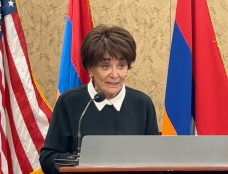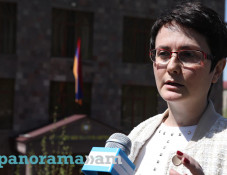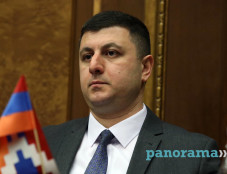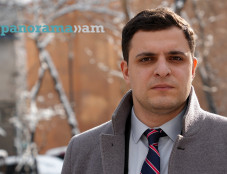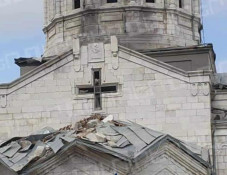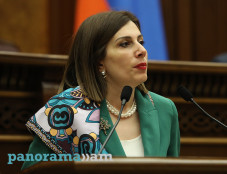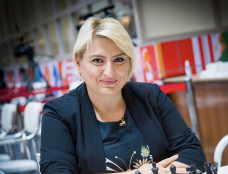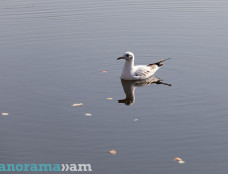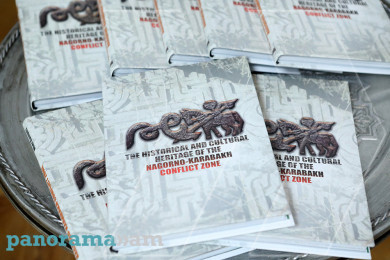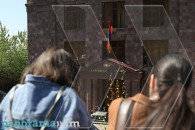C10th Arab geographer about customs of inhabitants of country of Khazars who did not look like Turks
In the 29th issue for the year 1901 of the project “The Collection of Materials to Describe the Terrain and Tribes in the Caucasus,” N. A. Karaulov published a study titled “Arabian writers’ data about the Caucasus, Armenia and Aderbeijan. Part 1. Al Istakhri.” The merit of Karaulov’s work is that he publishes a full translation of the 10th century Arab geographer Al Istakhri’s “Book of Roads and Kingdoms” attaching also the original in Arabic and giving some information about the authors and their work.
“A part of Deylem, Tabaristan, Jurjan and a portion of the desert situated between Jurjan and Khorezm lie to the east of the Khazar Sea; Arran, Serir’s border areas, Khazar lands and a part of the Ghuzz desert to the west; Ghuzz desert from Siya-Kukh’s side to the north; and Jil and Deylem to the south,” this is how the Al Istakhri localizes the country of Khazar.
Describing the Caspian Sea, he notes that “that sea” is not connected to any of the other seas. If one goes around the sea on foot, he can eventually reach the starting point. “There will be no obstacle on the way save for only some freshwater river flowing into this sea,” the author writes. Further, the author lists Khazar’s neighboring countries across which one can get there. The way from Abbaskun to Khazar land along the left coast lied through the settlements adjacent to the place. “… first, you go through the lands of Jurjan, Tabaristan, Deylem and Jil, then you cross Arran’s border, and after passing Mukan, there is a two days trip along satrapy of Sharvanshah from Bab-ul-Abwab, further you cross this country till Semender in four days, and there is another seven days trip from Semener to Itil through the desert. There is no settlement between Bab-ul-Abwab and Khazars,” the author indicates. There was a narrow channel on the Khazar Sea from Sia-Kukh’s side. The ships driven there by the wind faced the danger of wrecking, and once wrecked, nothing would be possible to save from its remains because of the Turks ruling over the places, as they would immediately seize everything. Khazar was the name of the country, and Itil was its capital taking its name from the major river Itil (Volga) flowing to the city from the country of the Russes and Bulgars. The city of Itil was separated into two parts; the larger part was on the western bank of the river Itil and was surrounded with a wall, and the other part was on the eastern bank. The king resided in the western part of Itil, and was called “bek” or “bak” in their language.
The geographer notes that the only burnt-brick building in the whole capital was the palace belonging to the king. “The buildings are scattered all over that city and felt tents serve as dwelling places, with the exception of some clay housings,” Al Istakhri writes. Besides, there were markets and baths in the city, he adds. As for the ethnic composition of the population, Al Istakhri notes that the king and his court belonged to the Judaic faith, the population of the city, however, consisted of Christians, Muslims and Pagans. “Idolatry practices dominate among their customs, and they bow to the ground to each other as an expression of respect,” Al Istakri writes. He points out the pagan customs Khazar’s people retained, which contradicted to the Muslim, Judaic and Christian religions. According to Al Istakhri, the king had 12 thousand troops. “When some of them dies, another one immediately replaces him,” Al Istakhri writes. The army did not get a constant salary, and they rarely “received a small sum” during military operations or when they were assigned some task, for which they united. Al Istakhri also recounts interesting information about the judicial proceedings conducted in the country of Khazars. The king had seven judges – Judaic, Christian, Muslim and Pagan – who addressed all the lawsuits. The plaintiffs did not appeal to the king but to those judges. “On the day of the trial, there is a mediator between the judges and the king. Through him, the judges communicate with the king the cases in hearings. This way, the cases are presented to the king’s consideration, and he delivers his order to them, which they execute,” the geographer writes. According to Al Istakhri, the Khazars were so obeying to their king that when some of them was to be killed and the king did not want him to be killed, he ordered him to commit suicide, and he went home and killed himself. “As their government regards, their head is called ‘khakan-khazar.’ He ranks higher than the king of the Khazars, but is appointed by the king,” Al Istakhri writes. According to him, the khakan was elected in the following way: “When the king decides to appoint someone a khakar, this person is summoned and throttled with a silk cord. When he is about to drew his last breath, he is asked, ‘How long do you wish to reign?’ and he calls a number of years. Upon the completion of this term, the khakan is killed, unless he died before. Only descendants of noble families can become khakans of the Khazars, irrespective of their financial situation.” Although khakan-khazar’s authority was nominal, people respected and bowed to him. Only the king and people belonging to the same rank as him could enter his place. “The king visits khakan only in case of an important event. While entering, he prostrates and bows to him, then stands in distance until the khakan allows him to come up,” Al Istakhri describes. According to the geographer, when there was some grave danger, khakan was brought to the public, “and as soon as someone from the Turks and neighboring ‘kafir’ peoples sees him, they immediately take flight, and none of them decides on fighting with them out of respect to the khakan.” After khakan’s death, no one passes by his grave without bowing to his dust, and then sits on his horse until getting away “from the eyes of the khakan’s grave.” Further, Al Istakhri notes that there were no villages next to the city and their fields were scattered all around it. Rice and fish were their main food. “Only glue is made in the country of the Khazars and exported from it,” the geographer points. The goods exported from Khazar – honey, wax, beaver skin, quicksilver, wool – were imported there from the lands of the Russes and Bulgars. “The Khazars and their neighboring peoples wear jackets and men’s tunics. The Khazars do not make clothes themselves, but import them from the countries of Jurjan, Tabaristan, Armenia, Aderbeijan and Rum,” Al Astakhri writes. “The Khazars have another city called Semender, with Muslim-majority population. There are gardens between it and Bab-ul-Abwab (Derbent) belonging to Semender. These gardens are said to have 4000 grape vines and reach the boundaries of Serir,” the geographer writes. He also notes that the king of Semender belonged to Judaic faith and was in kinship with the king of the Khazars. Serir’s people were Christian, and Semender was in armistice with them, Al Istakhri writes. According to legend, the golden throne of a Persian king was in Serir. “I am not aware of any densely populated area in Khazar territory save for Serir,” Al Istakhri writes and adds that no other people lived between the Khazars and the tribes of Burtases, people scattered across the valley of the river Itil. “Burtas is the name of a country, just like Russ and Khazar, and Serir is the name of a state, and not of a city or people,” the geographer notes. As for the Khazars’ appearance, Al Istakhri describes that the dark-haired Khazars did not look like the Turks. They were separated into two groups: “karakhazars” – dark, almost black, like Indians, while the other group was white, standing out with beauty and looks. “Any Khazar slave we get belongs to the pagans, who allow selling their children and enslaving each other. While the Jews, Christians, like Muslims, do not allow to enslave each other out of their religious views,” Al Istakhri notes. “The Collection of Materials to Describe the Terrain and Tribes in the Caucasus” is a large-scale publication of narrative sources carried out by the management of the Caucasus Educational Okrug in 1881-1908. It includes researches and description of the history, life, and ethnographic characteristics of the peoples inhabiting the Caucasus region of the Russian Empire. Related: C10th Arab geographer about Armenia and gates of Derbent protecting region from Turks http://www.panorama.am/en/region/2015/08/24/history1/ 10th century Arab geographer about Armenian carpets, silk and dye “vordan karmir” http://www.panorama.am/en/popular/2015/08/26/vordan-karmir/ Scientific publication of Russian Empire about destruction of Christian monuments in Barda by Tatars https://www.panorama.am/en/miscellaneous/2015/08/15/history/?sw Scientific publication recounts historical data about C15th Armenian village Kusapat in Artsakh http://www.panorama.am/en/miscellaneous/2015/08/07/history/?sw Scientific edition of Russian Empire: Nakhijevan was prominent Armenian city founded in C16 BC http://www.panorama.am/en/world/2015/08/03/nakhijevan/?sw
Newsfeed
Videos





